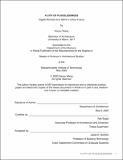A city of placelessness : digital nomads and Tallinn's urban future
Author(s)
Wang, Haoyu,S.M.Massachusetts Institute of Technology.
Download1196907570-MIT.pdf (74.25Mb)
Alternative title
Digital nomads and Tallinn's urban future
Other Contributors
Massachusetts Institute of Technology. Department of Architecture.
Advisor
Rafi Segal.
Terms of use
Metadata
Show full item recordAbstract
Placelessness describes a state of people and activities that are not confined to fixed places. By creating a placeless ground for work and social activities, digital connectivity redefines work-live habits, contributing to a growing population of digital nomads: people who utilize remote work and personal mobility to avoid restrictions of fixed places in their living. Through activities of digital nomads, this thesis explores the potentials of placelessness in shaping an alternative urban future. As a mobile workforce with increasing powers in technology, digital nomads gain political supports from Estonia where their visits have been transforming the capital city of Tallinn into a digital nomad hub. On the other hand, their spatial implications and social segregations from local people have drawn little attention in Tallinn's urban developments. To envision Tallinn's urban future under placelessness, the thesis takes digital nomads as a stimulus to architecture and urbanism that integrates placelessness into local identities. It proposes design interventions on a former industrial site that accommodate an alternative urban life informed by digital nomads while encouraging placeless people to take an active part in the city's post-industrial transitions. The thesis demonstrates new spatial forms and typologies across scales that seek to inspire future urban developments in Tallinn and other cities populated with placeless people. On the other hand, while we witness placelessness through the work-from-home scenarios under the crisis of COVID-19, this thesis encourages us to look beyond the current state of emergency and reimagine placelessness in a future urban life where we reclaim our access to the public ground and personal mobility.
Description
Thesis: S.M., Massachusetts Institute of Technology, Department of Architecture, May, 2020 Cataloged from the official PDF of thesis. Includes bibliographical references (pages 146-150).
Date issued
2020Department
Massachusetts Institute of Technology. Department of ArchitecturePublisher
Massachusetts Institute of Technology
Keywords
Architecture.